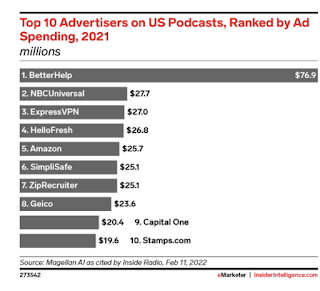Your favorite podcast host may be a robot
SkyNet is here, everybody. Podnews by Pod People reported the other day that The A.I.M.E.E. Allen Show has launched, and is hosted by a sentient robot interviewer. Some podcasts are already artificially-hosted, artificially-written and artificially produced, PodNews by Pod People explains. Last year, PodNews by Pod People covered Deep Dreams ▸ which is entirely AI-authored.
Now, I wonder if Roman Mars of 99% Invisible is a real human being. Show yourself, Mr. Mars. After all, he does seem to have the perfect podcast voice. Maybe, too perfect.
Has anyone ever met Michael Barbaro from The Daily? Could The New York Times have pulled off the ultimate ruse? At least we know Joe Rogan is human. No robot could be that -- Wait a minute. Maybe the robot Joe Rogan wants us to think he's a human by acting like someone who's been punched in the face too many times?
The Top 10 Advertisers Ranked by Ad Spending: What Does It Mean?
The top ten advertisers based on ad spending for podcasts may or may not hold surprises for podcast fans. Better Help, the therapy service, holds a commanding lead in ad spend, with more than almost three times the spend of the second place advertiser, NBCUniversal.
With several millions of jobs still unfilled, it's natural that ZipRecruiter would be in seventh place. Today, employers are not as picky as they were several years ago when they demanded a master’s degree in Hospitality to work at an IHOP.
HelloFresh has been an aggressive podcast advertiser for years, with surging sales numbers to support their strategy. Of course, Geico is in eighth place because advertising is life for insurance companies, since most offer the same services, unless you're lucky enough to have USAA.
Malcolm Gladwell on "Revisionist History" and the Opioid Crisis
On the July 8th episode of Malcolm Gladwell's Revisionist History, you will understand the importance of carefully designed regulation and how it can save lives. Listening to the episode will definitely leave you angry, because one simple, bureaucratic rule followed by all 50 states instead of just five could have significantly reduced the deaths and suffering from the opioid crisis.
In the episode, Gladwell explains how five states adopted a triplicate prescription procedure, whereby any doctor who wrote a prescription had to use a pad with two carbon copies. Since the government in those states compiled and could evaluate the prescriptions written by each doctor, the number of prescriptions for opioids in those five states was massively lower than the other 45 states with no such restriction.
Gladwell details how many thousands of lives would have been saved if every state adopted this admittedly tedious yet vital procedure.
I think the episode points out a critical point about government regulation. Just as over regulation has its drawbacks by limiting economic growth, so too does deregulation when the capitalist marketplace takes advantage of the consumer. Companies like Purdue and the reprehensible Sackler family cared more about the bottom line than the lines of words in the obituaries for the hundreds of thousands who have dies from opioids.
Moreover, Gladwell also does something commendable that politicians avoid, like the truth. He admitted he was wrong in the episode. Check it out.


Comments
Post a Comment
Thank You for your input and feedback. If you requested a response, we will do so as soon as possible.